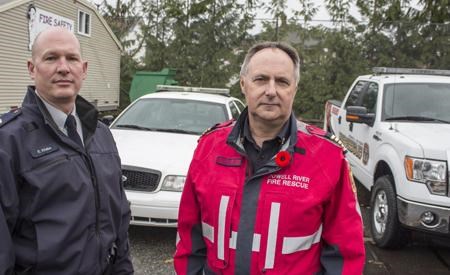Heads of Powell River’s police and fire services have told city council they are finding it difficult to meet minimum service levels because of chronic understaffing.
Staff sergeant Rod Wiebe, detachment commander of Powell River RCMP, and Powell River Fire Rescue chief Dan Ouellette made presentations for additional funding to City of Powell River’s finance committee on Tuesday, November 2.
Both departments are looking for funding for additional members to cover leaves and sick time and increase their capacity to handle emergencies.
Wiebe and Ouellette explained that overtime rates and potential for staff burnout have been rising as they juggle to maintain service levels.
Ouellette is also asking the city to maintain the two dayshift firefighters it brought on last spring.
“They helped up tremendously to maintain a minimum staffing level, particularly through our day shifts and during the summer when we are most vulnerable,” he said.
Industry standard for professional fire departments is a minimum of four full-time career firefighters. At that level, sick days and holidays can be covered with minimal need for overtime, added Ouellette.
Mac Fraser, city chief administrative officer, said he agreed to bring the additional staff on over the summer and has since come to better understand why they are needed.
“When responding to a structure fire with only two [fighters], they can’t go into the building to save someone,” said Fraser. “But I’m scared that they are heroes and go in anyway.”
The city finance committee requested more detailed explanations of the department’s current staff situation at a previous meeting.
The department has requested $127,000 to cover the firefighters’ salaries.
Ouellette added a number of other issues have compounded the department’s staffing problem. It is also struggling to maintain an adequate auxiliary group, he said.
An aging population is contributing to the difficulty of finding and retaining enough auxiliary members, a struggle not specific to Powell River, he said.
Recent intakes for auxiliary members have been in steady decline, he added. Ouellette estimated when the department responds to structure fires only half of the required numbers are able to attend.
Meanwhile, Powell River RCMP is requesting an additional $150,000 to bring two additional constables to the detachment.
Wiebe said he has 16 officers to put into the community on average, though the detachment should have 18.
“What this has identified is the inability for us to make any type of response without incurring huge costs in overtime,” he said.
Like the fire department, Wiebe explained that police have a certain number of officers per shift to meet minimum service levels. Wiebe cancelled all holiday leave in September for his members because there was not enough staff to cover these minimums.
The detachment has not seen an increase in officers in more than a decade, he said.
Wiebe told the committee that during the recent death investigation in Townsite the detachment had to bring in officers from Vancouver Island because of the staff shortage.
While the crime rate has dropped and remained lower over recent years in Powell River, police workload has generally increased, he said.
Since the province’s Mental Health Act was updated in 2004, BC police forces have increasingly become the frontline for assistance for people with mental illness. And those officers are required to wait at the hospital until they are able to release the person into the hospital’s care.
There has also been an increased amount of time needed for officers to enter data into a records management system that was introduced in 2007, added Wiebe.
Powell River RCMP has not, like many other detachments, placed limits on what types of calls to which officers respond.



